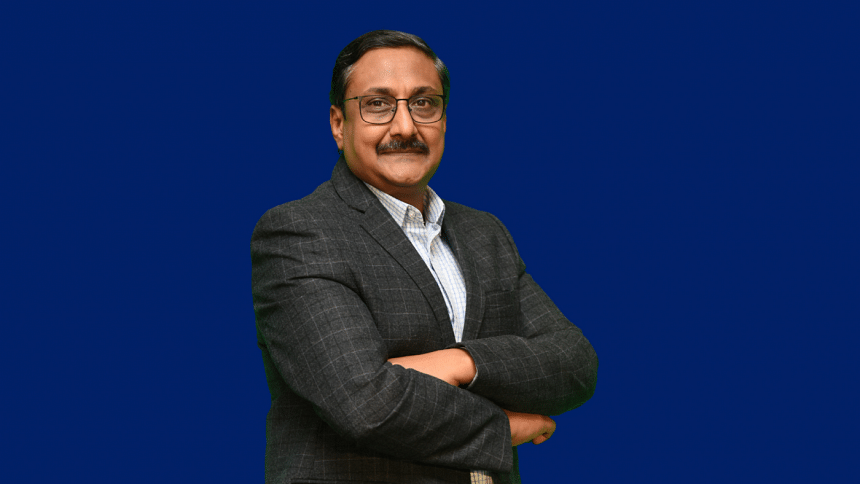Interview with Arun Rajamani, Managing Director, Cambridge University Press and Assessment, South Asia

Arun Rajamani is the Managing Director at Cambridge University Press and Assessment, South Asia. He has been responsible for building the Cambridge University Press and Assessment the brand from the over a year in its journey to becoming a not-for-profit organisation that provides world-leading academic research, learning and assessment globally, backed by the first-class teaching and research departments of the University of Cambridge.
A signing ceremony, held on August 22, at the DPS STS Junior School auditorium featured Arun and the CEO of STS Group, Manas Singh, wherein they signed the agreement for offering Cambridge EY on behalf of their respective organisations. Principal of the DPS STS School Dhaka, Dr Shivananda CS and other esteemed guests attended the ceremony alongside parents of the DPS STS students. Campus had the opportunity to sit down with Arun for a quick interview after the event.
Campus: With your extensive experience in the South Asian Education Industry, could you highlight notable practices in the region that have caught your attention, whether positively or negatively?
Arun: In the South Asian region, there has been a historical neglect of the early education sector. Now there are many types of curriculums coexisting in countries and it is important to note that each curriculum comes with its own set of values and belief systems that influence how knowledge is imparted to students. Many South Asian countries, including Bangladesh, are increasingly recognizing the importance of adopting a more globalized education system. This shift is motivated by the need to prepare the youth for the ever-evolving and interconnected world. By incorporating global perspectives and interdisciplinary approaches, educational systems in the region are striving to make students more adaptable and resilient in the face of emerging challenges.
C: In the context of early childhood education, what is your perspective on the potential impact of the Cambridge curriculum on the education sector in Bangladesh?
A: The Cambridge curriculum aims to cultivate confident, curious, and knowledgeable children. It seeks to reform the early education sector by providing a strong foundation for young learners. The goal is to equip children with four key skills: critical thinking, data evaluation, decision-making, and problem-solving. These skills are essential for them to tackle challenges they will be facing in the future like climate change or cross-border trade.
C: Could you provide details about the inception of the Cambridge Early Years Program, including its start date and the regions it was first launched in?
A: The program was launched in 2020, a year that was marked by the global pandemic. The program's inception took place in India, where a considerable amount of research and development efforts were invested to create a curriculum that would effectively cater to the needs of young learners. As we proceeded with this new system, we saw its potential to adapt to other neighbouring countries in the region where similarly many curriculums were coexisting. We therefore, felt positively about expanding it to countries like Bangladesh and Sri Lanka.
C: How did you adapt the program to the challenges posed by the pandemic during its launch?
A: This sort of program usually thrives in and requires a lot of physical presence. However, in order to accommodate the children into this system during the pandemic we did something unique. For instance, we trained our teachers, shipped all resources and tools to students at their homes, and engaged parents in the learning process. So, the parents had to assume the role of the teacher and it all came together as beneficial to students.
C: How does the Cambridge Early Years Program cater to diverse learner needs, and what challenges and opportunities has it encountered in the South Asian region?
A: Our learning program is very student-centric. In this system, we carefully compile student profiles through digital assessment and test student's critical thinking abilities and capabilities through a story-based assessment approach. We also use a lot of unique learning resources and learning tools Since this curriculum puts a lot of focus on non-traditional modes of assessment, teachers are able to identify where a student's strengths and weaknesses lie. Therefore, they are able to cater to a child's individual and diverse needs instead of imposing a general mode of assessment for everyone that may not be the best fit for a child.
C: Can you elaborate on the teacher training aspect of the program?
A: The teacher's training program is a three-six-month training period where they focus on early childhood care, children's motor skills and critical thinking development. This is all followed by an assessment for the teachers to ensure they meet the curriculum's standards. The assessments measure how well the teachers can implement the objectives of the curriculum and how well they are able to correlate assessments to a child's capabilities.
C: Could you share an anecdote on the positive outcomes resulting from the implementation of Cambridge Early Years in other regions it is operating in?
A: The reports that we have indicate a significant positive impact. Children in the program demonstrated better adaptability to the school system which was particularly noteworthy during the early days of the pandemic when many children hadn't attended school for an extended period. Despite this, children in our program managed exceptionally well in the classroom environment once they were back to school which I strongly believe signifies the cutting-edge characteristic of our curriculum.
Irina Jahan is a contributor for CAMPUS, The Daily Star

 For all latest news, follow The Daily Star's Google News channel.
For all latest news, follow The Daily Star's Google News channel. 



Comments